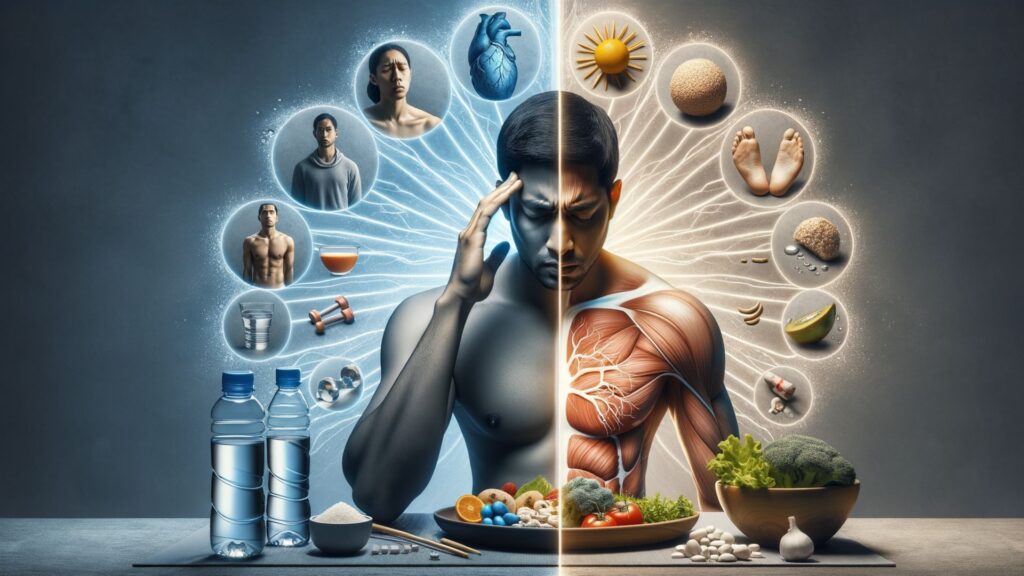Headache Side Effects of the Carnivore Diet
The carnivore diet has gained significant attention in recent years as a high-fat, animal-based approach to eating. Advocates of this diet claim various health benefits, including weight loss, improved energy levels, and mental clarity. However, as with any dietary plan, there are potential side effects to consider, especially concerning headaches and migraines. One potential side effect of the carnivore diet is headaches, which can occur due to a variety of reasons.
Some individuals may experience headaches as their body adjusts to the sudden increase in fat intake, while others may find that they are not getting enough electrolytes, such as sodium and potassium, which can lead to dehydration and headaches. Additionally, eliminating carbohydrates from the diet can also trigger headaches in some people, as the body may struggle to adapt to using fat as its primary source of energy.
Migraines, a more severe form of headache, may also be triggered by the carnivore diet in some individuals. Certain foods commonly consumed on the carnivore diet, such as aged meats, processed meats, and dairy products, have been linked to an increased risk of migraines in susceptible individuals. Furthermore, the restrictive nature of the diet may lead to nutrient deficiencies, particularly in key vitamins and minerals that play a role in migraine development, such as magnesium and riboflavin.
If you are considering trying the carnivore diet and are experiencing headaches or migraines as a result, it is important to consult with a healthcare provider or a registered dietitian to address any potential deficiencies or underlying health issues. They can help you make modifications to your diet and develop a plan that supports your overall health and well-being.
Additionally, staying adequately hydrated, balancing your electrolytes, and incorporating a variety of nutrient-dense foods into your meals can help minimize the risk of headaches and migraines while following a carnivore diet.
Carnivore Diet Overview
What is the carnivore diet and how does it work?
The carnivore diet is a dietary approach that focuses on consuming animal products exclusively while eliminating plant-based foods. Followers of this diet typically eat meat, fish, eggs, and certain dairy products while avoiding carbohydrates and other food groups. The idea behind the carnivore diet is to mimic the eating patterns of our ancestors, emphasizing nutrient-dense animal foods.
Benefits of following a carnivore diet
Proponents of the carnivore diet claim benefits such as improved digestion, reduced inflammation, and better blood sugar regulation. Many individuals report significant weight loss and increased muscle mass when following a strict carnivore diet. Some even suggest that this way of eating can alleviate autoimmune conditions and skin problems.
Starting a carnivore diet for beginners
For those considering transitioning to a carnivore diet, it is essential to do thorough research and understand the potential impact on their bodies. Gradually reducing carbohydrate intake and increasing consumption of animal products can help ease the transition and minimize any initial side effects.
Understanding Migraines and Headache Triggers
How do migraines differ from regular headaches?
Migraines are severe headaches that can cause intense throbbing or pulsing sensations, often accompanied by nausea, vomiting, and sensitivity to light and sound. Unlike regular headaches, migraines can last for hours to days and significantly impact daily activities and quality of life.
Identifying common migraine triggers
Common migraine triggers include stress, hormonal changes, certain foods or additives, lack of sleep, and environmental factors. Individuals with a history of migraines are advised to keep a diary to track potential triggers and patterns to better manage their condition.

Managing migraines while on a carnivore diet
While some individuals may find relief from migraines when following a ketogenic diet like the carnivore diet, others may experience headaches as a side effect of the dietary changes. It is crucial to monitor the frequency and intensity of migraine episodes when transitioning to a high-fat, low-carb eating plan.
Side Effects of the Carnivore Diet
Potential short-term side effects of the carnivore diet
When transitioning to a carnivore diet, some individuals may experience short-term side effects such as fatigue, dizziness, and headaches as the body adapts to using fat for fuel instead of carbohydrates. These symptoms are often referred to as the “keto flu” and typically subside as the body adjusts to the new metabolic state.
Potential long-term side effects of following a carnivore diet
Long-term adherence to a carnivore diet may lead to nutritional deficiencies, particularly in vitamins and minerals found in plant-based foods. Additionally, some individuals may experience digestive issues or changes in cholesterol levels when consuming high amounts of animal products and saturated fats over an extended period.
Ways to mitigate side effects on the carnivore diet
To mitigate potential side effects of the carnivore diet, it is crucial to prioritize nutrient-dense animal products, incorporate a variety of meats and organ meats, and consider supplements to ensure adequate intake of essential nutrients. Monitoring overall health markers and consulting a healthcare professional regularly can help prevent any adverse effects of long-term carnivore dieting.
Nutritional Considerations on a Carnivore Diet
Importance of electrolyte balance on a high-fat diet
Electrolyte imbalances can occur when following a high-fat diet like the carnivore diet, leading to symptoms like muscle cramps, fatigue, and headaches. Ensuring sufficient intake of sodium, potassium, and magnesium is essential to maintain electrolyte balance and support overall well-being.
Role of carbohydrates and ketosis in migraine management
Carbohydrate restriction and entering a state of ketosis can influence brain function and potentially reduce the frequency and intensity of migraines in some individuals. However, the impact of ketosis on migraine management may vary among migraine sufferers, highlighting the need for personalized dietary approaches.
Optimizing magnesium intake while on a carnivore diet
Magnesium plays a crucial role in various bodily functions, including nerve transmission and muscle relaxation. As the carnivore diet may limit dietary sources of magnesium, incorporating magnesium-rich foods like dark leafy greens or considering supplementation can help prevent deficiencies and support migraine management.

Seeking Professional Advice
Consulting a healthcare professional before starting a carnivore diet
Before making significant dietary changes, such as transitioning to a carnivore diet, individuals are advised to consult with a qualified healthcare professional. A healthcare provider can assess individual health status, provide personalized recommendations, and monitor any potential side effects or impacts on existing health conditions.
Considering the impact of the carnivore diet on gut microbiome
The carnivore diet’s emphasis on animal products and the exclusion of plant-based foods may affect the diversity and composition of the gut microbiome. Maintaining a healthy gut microbiota is essential for digestion, immune function, and overall health, underscoring the importance of balancing dietary choices for long-term well-being.
Incorporating expert guidance for a balanced high-fat diet
For individuals interested in following a high-fat diet like the carnivore diet, seeking guidance from knowledgeable nutritionists or dietitians can help ensure a balanced approach that meets individual nutritional needs. Expert advice can offer valuable insights on meal planning, nutrient optimization, and sustainable practices to support health goals while minimizing potential risks.

Headache on Carnivore Diet Frequently Asked Questions:
What are the short-term side effects of starting a carnivore diet?
Some individuals may experience headaches or migraines when first transitioning to a carnivore diet due to changes in nutrient intake and potential carb withdrawal.
How can migraines be managed while on the carnivore diet?
Migraine frequency and intensity can potentially be reduced by ensuring adequate hydration, electrolyte balance, and managing stress levels while on the carnivore diet.
Are there any long-term side effects associated with the carnivore diet?
Long-term effects of the carnivore diet may include nutrient deficiencies if not carefully planned, although some individuals report beneficial effects on migraine occurrence and symptoms.
What foods should be avoided on a carnivore diet to prevent triggering migraines?
Foods high in carbohydrates, artificial additives, and potential migraine triggers such as processed meats may need to be avoided on a carnivore diet to help mitigate migraines.
How can ketone bodies produced on a carnivore diet help with migraine relief?
Ketone bodies produced from fat metabolism on a carnivore diet have been suggested to have neuroprotective effects that may help mitigate migraine symptoms and frequency.
What are some of the reported benefits of following a carnivore diet for migraine management?
Some individuals have reported a reduction in the intensity of migraine attacks, a decrease in migraine occurrence, and overall improvement in migraine symptoms while on a carnivore diet.
Are there any scientific studies supporting the use of a carnivore diet for migraine relief?
While there is limited research, some randomized controlled trials have explored the potential benefits of the carnivore diet in mitigating migraines and improving overall health outcomes.
What could be causing headaches on a carnivore diet?
Headaches on a carnivore diet could be caused by electrolyte imbalances, dehydration, the adaptation phase to ketosis (often referred to as keto flu), nutrient deficiencies (such as magnesium), or the elimination of carbohydrates which can initially affect blood sugar levels.
How do I manage electrolyte balance on a carnivore diet to prevent headaches?
To manage electrolyte balance, ensure adequate intake of sodium, potassium, and magnesium. This can be done by salting your food generously with high-quality salt, consuming bone broth, and incorporating foods like fish for potassium and supplementing with magnesium if necessary.
Can a carnivore diet provide all necessary nutrients to avoid headaches associated with deficiencies?
A well-planned carnivore diet can provide most essential nutrients. However, some individuals may still experience deficiencies in electrolytes or vitamins like vitamin D3 if not exposed to enough sunlight. Its important to monitor your bodys response and consider supplementation or dietary adjustments accordingly.
Is it normal to experience an energy dip or headaches during the transition into a carnivore diet?
Yes, it is common to experience an initial energy dip or headaches during the transition phase as your body adapts from burning glucose for energy to using fats (ketones). This period is temporary and usually resolves within a few days to weeks.
How long should I expect adaptation-related headaches to last when starting a carnivore diet?
Adaptation-related headaches typically subside within the first week or two as your body becomes efficient at utilizing fats for fuel. If they persist beyond this period, it may be worth consulting a healthcare professional and reviewing your dietary intake for potential gaps or imbalances.





